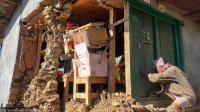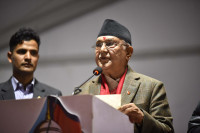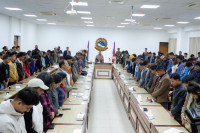Opinion
Financing a bright future
A successful replenishment of the ADF will help low-income countries to expand on their progress
Indu Bhushan & Kenichi Yokoyama
Asia has come a long way since the establishment of the Asian Development Bank (ADB) 50 years ago. As economies have grown, absolute poverty has plunged in countries receiving concessional assistance, such as Nepal.
So there is a good reason for optimism, for the region and for Nepal, as 31 donors gather today in Kathmandu for the 11th replenishment meeting of the ADB’s concessional financing window, the Asian Development Fund (ADF). Donors have contributed more than $30 billion to ADF since its inception. ADB proposes to deploy about $17 billion of concessional resources over next four years in the region, which will be the main agenda of this week’s discussion with the donors.
Growth constraints
While countries receiving concessional assistance have made progress on sustaining economic growth and reducing poverty, development challenges still abound. Around 90 million people continue to suffer from absolute poverty in these countries. The number of people living on between $1.90-a-day and $3.10-a-day—who are vulnerable to falling into absolute poverty when subject to shocks—more than doubled from 1990 to 162 million in 2012.
Against this background, Nepal faces special challenges. Strong and inclusive economic growth in the country is impeded by its rugged terrain, inadequate infrastructure, and lack of a conducive environment for private sector investment. Power shortages, difficult labour relations, and low human capital also constrain growth.
Country ownership of development efforts as well as domestic financing are key to addressing development challenges. However, countries like Nepal have limited financing options. While mobilising revenue at home is critical, their capacity to do so is limited by under-developed banking and capital markets.They also lack capacity to efficiently deploy the revenue they possess.
Moreover, the longer reach of the new Sustainable Development Goals (SDGs), which replaced the Millennium Development Goals (MDGs) last year, demands even more financing and support to bridge development gaps in these countries.
This highlights the continuing importance of official development assistance, including ADB’s concessional financing. ADB’s focus for the 2017 to 2020 period of ADF operations is to accelerate its support to low-income countries as they tackle roadblocks to inclusive and sustainable growth such as natural disasters, gender inequity, critical infrastructure and human capital shortfalls, food scarcity and climate change.
What will this mean for Nepal? As in much of Asia and the Pacific, natural disasters are an ever-present threat in this country. Low-income countries are acutely vulnerable to the impacts of disasters, collectively suffering more than 155,000 deaths between 2006 and 2015, as well as physical losses of $11.4 billion.
Disaster risk reduction measures can reduce these losses, as shown by the Nepal government’s school safety programme which enabled 160 public school buildings—modified to make them more resilient to earthquakes—to withstand last year’s quake and numerous aftershocks.
ADB concessional assistance will continue to support a wide range of disaster risk reduction solutions for Nepal. They will include “hard” measures such as flood embankments, storm-water drainage networks and seismic retrofitting projects, as well as “soft” components like disaster risk assessments and mapping.
Gender considerations
A second priority in Nepal is to enhance the lives of women. Nepal has made large strides on gender equality, and was an early achiever of the MDG of attaining gender parity in primary and secondary level enrolment.
ADB will deepen its engagement with the government’s efforts to combat discrimination against women and promote their economic self-sufficiency. ADB already has notable success in this area. In 2004, ADB’s Gender Equality and Empowerment of Women Project paved the way for landmark legislation including the Domestic Violence Act, the Gender Equality Act, the National Women’s Commission Act, and the National Dalit Commission Act which safeguards the rights of Dalit communities.
Building on these successes, ADB will continue its two-pronged approach of supporting the inclusion of gender considerations in planned policy actions, while making direct investments in women and girls. A key priority will be to improve women’s access to economic opportunities and jobs through credit and financial services, and by upgrading skills particularly in “non-traditional” professions such as engineering.
Better days ahead
Given the region’s large unmet development challenges, it is our hope that ADF will make an even stronger contribution to rapid socioeconomic development in low-income countries. These countries will benefit from the merger last year of the ADF with the Ordinary Capital Resources balance sheet, which allows ADB to boost loan and grant assistance to them by up to 70 percent.
ADB also continues to help countries build the capacity needed to pursue their development goals. A successful replenishment of the ADF will help low-income countries to expand on their progress, bringing meaningful change to the lives of their citizens.
Vulnerable people in Nepal and across Asia and the Pacific need further support. Through enhanced assistance and sustained commitment, they can have the bright future they deserve.
Indu Bhushan is Director General, Strategy and Policy Department at ADB; Kenichi Yokoyama is Country Director at ADB’s Nepal Resident Mission




 16.12°C Kathmandu
16.12°C Kathmandu










